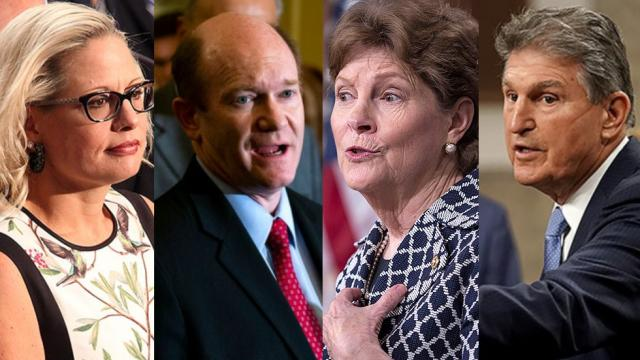
One of President Biden’s top policy goals, an increase in the federal minimum wage to $15 an hour by 2025, suffered a big setback Friday when eight members of the Senate Democratic caucus voted against it.
An effort by Senate Budget Committee Chairman Bernie Sanders (I-Vt.) to waive a procedural objection to adding the $15 minimum wage to a COVID-19 relief package was resoundingly defeated by a vote of 58-42 in which seven Democrats and one independent joined all 50 Republicans.
Here are the eight members of the Senate Democratic Conference who voted against the $15 minimum wage:
Sen. Joe Manchin (D-W.Va.)
Manchin made clear last month that he opposed a $15 federal minimum wage and instead proposed $11 an hour, indexing it to inflation.
“I’m supportive of basically having something that’s responsible and reasonable,” he said.
He hails from a state that voted overwhelmingly for former President Trump in 2016 and 2020, with 68 percent and 69 percent of the vote, respectively.
Manchin, the most conservative member of the Democratic conference, has emerged as a powerbroker in the 50-50 Senate where the defection of a single Democrat can derail Biden’s agenda.
Sen. Kyrsten Sinema (D-Ariz.)
Sinema is a Democrat with centrist leanings who is tough to predict.
She told Politico in February that she did not support adding a $15 minimum-wage provision to the $1.9 trillion COVID-19 relief package.
She split with fellow Arizonan Sen. Mark Kelly (D), who voted Friday to waive a procedural objection to setting a $15 nationwide wage standard.
Sinema was criticized immediately when a video clip of the vote circulated online showing her striding to the Senate well in a stylish sweater and skirt and flashing a thumbs down with a little bouncing bend of her knees.
Robert Nichols, president of Arizona Progressive People’s Alliance, a nonprofit group that supports progressive policies, slammed Sinema on Twitter for “gleefully voting” against the minimum wage amendment and said the senator was on “let them eat cake” vibes.
Nichols’s Twitter alias is Bobby Boucher, JD.
Sen. Jeanne Shaheen (D-N.H.)
Shaheen has expressed concerns about Sanders’s proposal to slowly raise the minimum wage for workers who receive tips, such as servers and busboys, to $15 an hour, eventually getting rid of the special “tipped wage” altogether.
“I support the minimum wage increase but I’m concerned about including the tipped wage provision because of the current status of the restaurant industry. We’ve had so many closings,” she said, adding the industry is in “difficult straits.”
Shaheen easily won reelection last year with 57 percent of the vote, but New Hampshire has traditionally been a battleground state.
Sen. Maggie Hassan (D-N.H.)
Hassan often sticks with her home-state colleague Shaheen and was spotted this week attending a bipartisan luncheon hosted by Manchin in the Dirksen Senate Office Building.
Hassan in 2014 advocated for raising the federal minimum wage to $10.10 an hour. She was vice chairwoman of the Democratic Governors Association at the time.
In 2016, she said New Hampshire should raise its minimum wage to at least $10 an hour but added “I think we should look at increasing it further moving forward.”
Sen. Jon Tester (D-Mont.)
Tester has hinted in recent weeks about his uneasiness about raising the minimum wage to $15.
“There has to be some conversation about how it’s done, and it can be done like that,” he said last month, snapping his fingers.
“I think the minimum wage needs to come up. But I think we need to extend it out a ways before it hits the $15 figure. How long that time frame is, is going to be up for debate,” he told “PBS News Hour” in late February.
Tester narrowly won reelection with 50.3 percent of the vote in 2018. Trump won the state by 20 points and 16 points in 2016 and 2020, respectively.
Sen. Tom Carper (D-Del.)
Carper represents one of the most pro-business states in the country and has raised concerns about the relief bill’s $1.9 trillion price tag.
“That’s a lot of money,” he told The Hill Thursday. “I used to be treasurer of Delaware. And for a guy who was treasurer of the First State, that’s a lot of money.”
A Congressional Budget Office analysis last month projected that raising the minimum wage to $15 an hour would increase the cumulative budget deficit by $53 billion over a decade.
The CBO also predicted a $15 minimum wage would cause the loss of 1.4 million jobs by 2025.
Sen. Chris Coons (D-Del.)
Coons is one of Biden’s closest Senate allies and an eloquent advocate for the president’s policy agenda, but he must also weigh his constituents’ interests in pro-business Delaware.
Delaware’s minimum wage rate increased to $9.25 in October of 2019 but its floor on tipped-wage workers is $2.23 an hour, according to the Delaware Department of Labor.
Coons in 2014 co-sponsored a bill to raise the federal minimum wage to $10.10.
He did not co-sponsor the Raise the Wage Act Sanders introduced in January, which 37 Democrats co-sponsored.
Sen. Angus King (I-Maine)
King is an independent who has caucused with Democrats since coming to the Senate in 2013.
He has worked behind the scenes in recent days to lower the income cutoff for people who are eligible to receive direct stimulus payments, helping to reduce the threshold for complete phaseout from $100,000 in individual income — which House Democrats approved — to $80,000.
King also voiced support this week for reducing weekly federal unemployment benefits from to $300. President Biden and House Democrats favored a $400 weekly federal plus-up.
King in 2014 supported raising the federal minimum to $10.10 an hour.
Maine Public Radio reported in January that King supported raising the federal minimum wage to $15 an hour but did not quote him saying so.
Via The Hill
